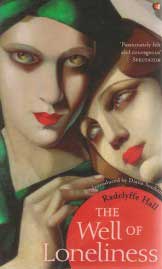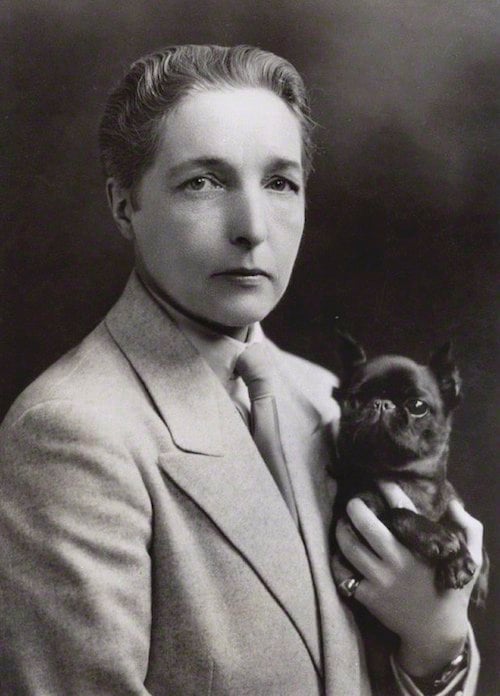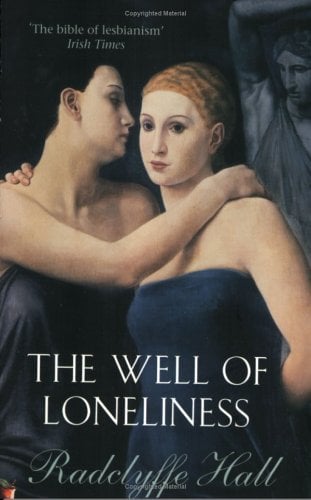The Well of Loneliness by Radclyffe Hall (1928)
By Nava Atlas | On March 13, 2023 | Updated August 28, 2023 | Comments (0)

Since its first appearance in 1928, The Well of Loneliness by Radclyffe Hall (1880 – 1943) has spurred much discussion and controversy. The semi-autobiographical novel about a young woman’s coming to terms with her lesbian identity, and perhaps more to the point, her maleness, caused a furor when first published in England.
Once denounced as immoral, it has also been praised as a courageous work of literature. It shocked some members “proper” society and served as an awakening to others who felt isolated by repressive social mores.
The Well of Loneliness is a semi-autobiographical story of Radclyffe Hall’s own life. Shockingly candid for its time, this novel was the very first to condemn homophobic society.
A book ahead of its time
At the time it was published, the story of same-sex love between women was a topic that was rarely written about outside of scientific textbooks. The book’s main character, Stephen Gordon, ruminates on her maleness and body dysphoria touchingly, using the limited descriptive language available at the time.
Banned outright in 1928 when first published in Britain, the novel went to trial for obscenity. Its publication marked an act of great courage by the publisher, which almost ruined Hall’s literary career. Although many decades have passed since its initial publication, the issued of prejudice and persecution that Radclyffe Hall addresses remain relevant today.
Receiving pushback from critics for her “sexually deviant” novel, Hall was swept into legal battles. Despite its early banning, the novel’s notoriety helped push narratives of lesbians in Western literature to the forefront. Hall made it clear to her publisher that she wanted the original text published, declaring:
“I have put my pen at the service of some of the most persecuted and misunderstood people in the world … So far as I know nothing of the kind has ever been attempted before in fiction.”
Surprisingly, The Well of Loneliness received more liberal treatment in American courts than it did in England. Justices dismissed charges of violation of Section 1141 of the Penal Law against Covici-Freide, Inc., American publishers of the book. The Court said:
“The book in question deals with a delicate social problem, which in itself cannot be said to be in violation of the law unless it is written in such a manner as to make it obscene, lewd, lascivious, filthy, or indecent, and tends to deprave and corrupt minds open to immoral influences.”
The ban on The Well of Loneliness was eventually overturned on appeal in 1959, long after Hall’s death (1943). Although she was vindicated by the American verdict, she steered clear of equal controversy in her subsequent literary works.
. . . . . . . . . .

Learn more about Radclyffe Hall
Photo courtesy of Wikimedia Commons
. . . . . . . . . .
Hall described herself as a “congenital invert,” referring to an innate characteristic. The term comes from early 20th-century sexologist Richard von Krafft-Ebing and refers to a type of inborn gender reversal where women could be born with a masculine soul and vice versa.
Though at the time the term referred more to homosexuality, the concept seems more akin to what today is referred to as transgender or nonbinary.
Brief synopses of The Well of Loneliness
What has remained Radclyffe Hall’s most famous work, The Well of Loneliness (1928), features a lesbian from an upper class family in England. Though born a daughter, her father bestows upon her the masculine name of Stephen.
The father is the epitome of kindness and understanding. Stephen’s mother Anna is more of the delicate society type, but though she doesn’t have the same understanding, is never unkind or uncaring until about mid-story, when she utterly rejects her unusual daughter.
After going through two intense, failed relationships, Stephen winds up with her partner, Mary Llewellyn. Their journey through a lesbian relationship during an era that rejected this expression of sexuality poses the setting and plot of the novel.
According to an introduction to an earlier edition of the book:
“The Well of Loneliness presents the life story of Stephen Gordon, the only child of Sir Philip and Lady Anna Gordon, who ardently desired a son in her place.
How this circumstance influenced a natural tendency towards masculinity in Stephen, her tortured adolescence, and her gradual development into maturity in this direction, with all its tragic implications, is the theme that is explored. Radclyffe Hall has treated this subject with delicacy and deep psychological insight, combined with frankness and sincerity.”
And more from a later edition of The Well of Loneliness (1990, Anchor Books/Doubleday):
“Originally published in 1928, Radclyffe Hall’s The Well of Loneliness is the timeless story of a lesbian couple’s struggle to be accepted by ‘polite’ society. When an unconventional woman named Stephen Gordon falls in love with an ingenue named Mary, their love affair gives Stephen her first taste of happiness.
However, the pleasure the lovers find in each other is quickly tarnished by the disapproval of friends and family who refuse to welcome the scandalous couple into their homes. But the most difficult test of the women’s love for each other comes when a young man offers to give Mary the respectability that Stephen can not.”
. . . . . . . . . .
Quotes by Radclyffe Hall, author of The Well of Loneliness.
. . . . . . . . .
Concern over censorship
Though considered bold and provocative for its time, many mainstream newspapers recoiled at the banning and censorship of this landmark book. Certainly, this echoes today’s emboldened attempts (often, alas, successful) to ban books with queer subject matter in libraries and schools.
Here is one of a number of such commentaries, expressing alarm over the censorship of The Well of Loneliness:
From the Daily Herald (London), August 24, 1928:
The question of literary censorship is brought to the forefront by the announcement that Miss Radclyffe Hall’s novel, The Well of Loneliness, has been withdrawn from publication at the request of the Home Secretary.
As the publishers had sent the book to Sir William Joynson-Hicks for judgment, they cannot very well ignore his request, but all who have at heart the interests of literature will be anxious that further light should be should be thrown on the subject.
The question is one which cannot be considered only as affecting the sale of a particular book. What the public is entitled to know is, on what grounds and by whose judgment are books banned or not banned? If the control of English literature is to be left to Sir Joynson-Hicks, authors and readers may well demand to know what qualifications he possessess as a judge of literature.
This is not by any means the first occasion on which a book or play dealing seriously with a grave social issue has been suppressed, while books and plays which are deliberately provocative in their sensual appeal pass unchallenged.
This question of censorship is one which calls for very grave consideration, and we hope that a full explanation will be forthcoming from the Home Office.
. . . . . . . . . .
More about The Well of Loneliness
- Wikipedia
- Reader discussion on Goodreads
- Full text of The Well of Loneliness on Project Gutenberg Australia
- Banned Books Week: The Well of Loneliness (NY Public Library)

Leave a Reply